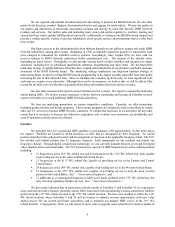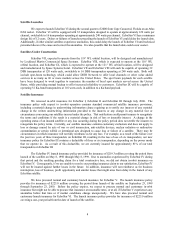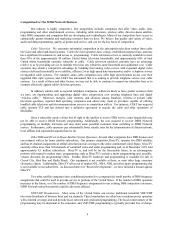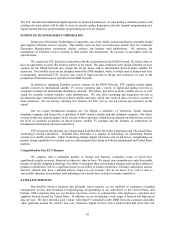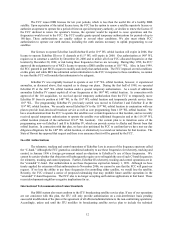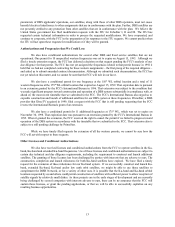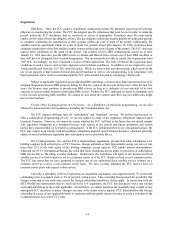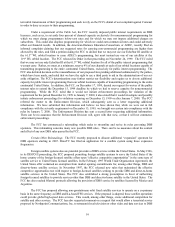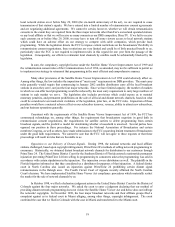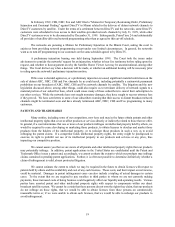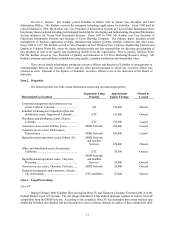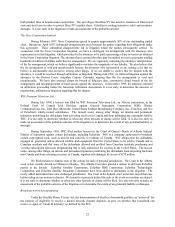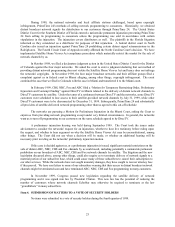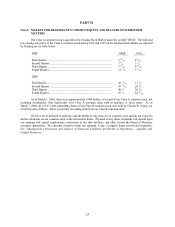Dish Network 1999 Annual Report Download - page 18
Download and view the complete annual report
Please find page 18 of the 1999 Dish Network annual report below. You can navigate through the pages in the report by either clicking on the pages listed below, or by using the keyword search tool below to find specific information within the annual report.16
terrestrial transmission of their programming and seek to rely on the FCC’s denial of our complaint against Comcast
in order to deny us access to their programming.
Under a requirement of the Cable Act, the FCC recently imposed public interest requirements on DBS
licensees, such as us, to set aside four percent of channel capacity exclusively for noncommercial programming for
which we must charge programmers below-cost rates and for which we may not impose additional charges on
subscribers. This could also displace programming for which we could earn commercial rates and could adversely
affect our financial results. In addition, the American Distance Education Consortium, or ADEC, recently filed an
informal complaint claiming that our requested rates for carrying non-commercial programming are higher than
allowed by the rules, and filed a petition asking the FCC to declare that we may not use our EchoStar III satellite at
the 61.5° WL orbital location to carry ADEC’s programming, but must instead use one of our satellites at the
119° WL orbital location. The FCC released its Order in that proceeding on November 24, 1999. The FCC ruled
that we may not use only EchoStar III at the 61.5° WL orbital location for all of the public interest programming that
we must carry. Rather, we must, at a minimum, reserve 4% of our channels at each of our orbital locations capable of
transmitting programming to the entire continental United States, exclusively for public interest programming. The
FCC also deferred decision on the reasonableness of our proposed fees pending additional submissions by the parties,
which have been made, and ruled that we have the right to use a third party to aid in the administration of our set-
aside obligation. The FCC’s determinations may further restrict our flexibility and require us to devote additional
capacity for public interest programming from our orbital locations capable of transmitting programming to the entire
continental United States. In addition, the FCC, on December 17, 1999, denied our request for waiver of the public
interest rules to extend the December 15, 1999 deadline by which we had to reserve capacity for noncommercial
programming. While the FCC ruled that it would not initiate enforcement proceedings for violation of the
requirement for the period December 16, 1999 to January 7, 2000, it also stated that it would investigate and possibly
initiate enforcement proceedings for violations occurring on December 15, 1999 or after January 7, 2000. The FCC
referred the matter to the Enforcement Division, which subsequently sent us a letter requesting additional
information. We have submitted that information and believe we have shown that, while we were not in full
compliance with the set-aside requirement on December 15, 1999, we brought our system into compliance with the
rules by January 7, 2000. The Enforcement Division has sent a second letter requesting additional information.
There can be no assurance that the Enforcement Division will, agree with that view, or that it will not commence
enforcement proceedings.
The FCC has commenced a rulemaking which seeks to streamline and revise its rules governing DBS
operators. This rulemaking concerns many new possible DBS rules. There can be no assurance about the content
and effect of any new DBS rules passed by the FCC.
Certain Other Rulemakings. The FCC recently proposed to allocate additional “expansion” spectrum for
DBS operators starting in 2007. DirecTV has filed an application for a satellite system using those expansion
frequencies.
Foreign satellite systems also are potential providers of DBS service within the United States. In May 1996,
in its DISCO II proceeding, the FCC proposed permitting foreign satellite systems to serve the United States if the
home country of the foreign-licensed satellite offers open “effective competitive opportunities” in the same type of
satellite service to United States licensed satellites. In the February 1997 World Trade Organization Agreement, the
United States offer contained an exemption from market opening commitments for, among other things, DBS and
direct-to-home satellite services. In November 1997, the FCC released new rules that maintained the effective
competitive opportunities test with respect to foreign-licensed satellites seeking to provide DBS and direct-to-home
satellite services in the United States. The FCC also established a strong presumption in favor of authorizing
foreign-licensed satellites to provide services other than DBS and direct-to-home satellite in the United States. The
FCC has also reached bilateral protocols allowing the provision of DBS service by satellites licensed by Mexico and
Argentina.
The FCC has proposed allowing non-geostationary orbit fixed satellite services to operate on a co-primary
basis in the same frequency as DBS and Ku-based FSS services. If the proposal is adopted, these satellite operations
could provide global high-speed data services. This would, among other things, create additional competition for
satellite and other services. The FCC has also requested comment on a request that would allow a terrestrial service
proposed by Northpoint Communications, Inc. to retransmit local television or other video and data services to DBS


